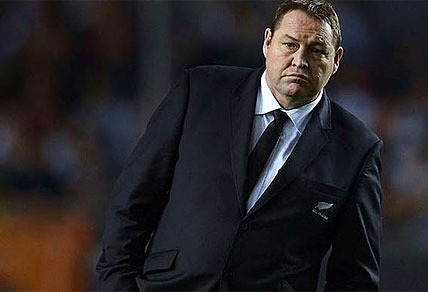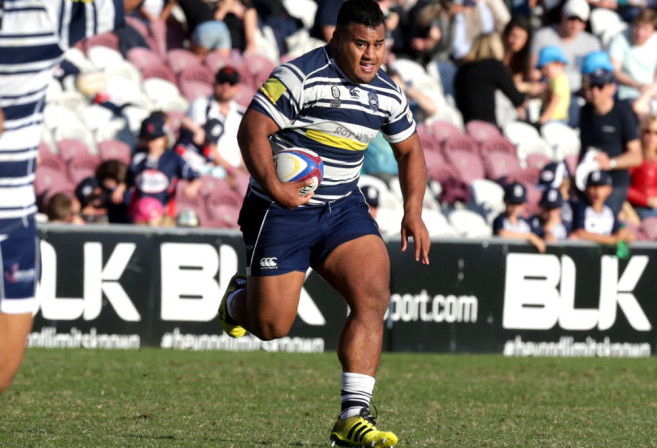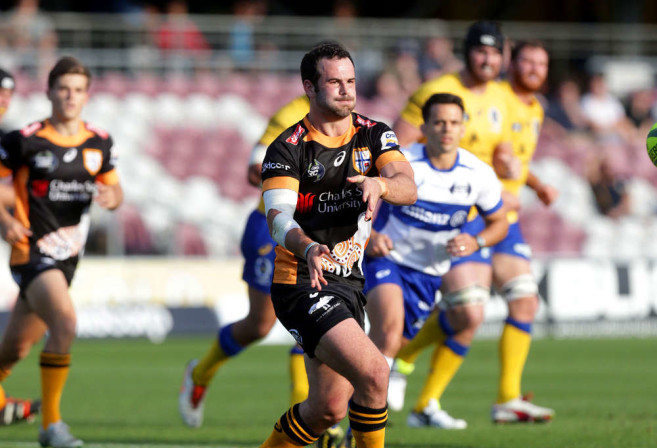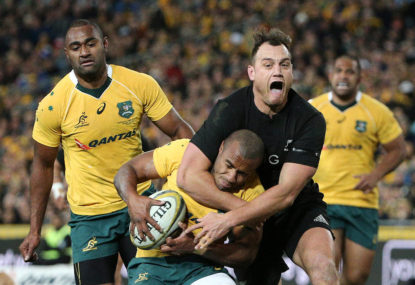Next Saturday in Auckland will be momentous, whatever the result. Either the All Blacks will claim a record for 18 consecutive Test wins, after faltering at 17 twice before, or the Wallabies will cause one of the biggest upset wins in their history.
And if that task wasn’t onerous enough, the absence of Will Genia, if not Australia’s best player in 2016 certainly their most consistent, only makes it more difficult again. Or enhances the legend if they happen to win.
Naysayers will rush to point out that the actual record belongs to Cyprus at 24 wins. They would of course be the same people who would cry foul if the New Zealand Rugby Union rushed to schedule matches against Cyprus and Azerbaijan (who Cyprus defeated to start their winning streak off) simply to get to 25 wins as fast as possible.
No doubt they would also squeal if the All Blacks side-stepped Andorra, who rudely bought Cyprus’ winning run to an end, just in case they suffered the same fate. It just wouldn’t be worth the New Zealand Rugby Union taking the risk.
Make no mistake, in this context, the only people rooting for Cyprus are non-rugby folk who don’t understand the game, or jealous narks desperate to pull New Zealanders down a peg or two.
There are 120 nations affiliated to world rugby, and one of the sport’s true gifts is how rugby people are able to travel the globe and engage other like-minded souls on the game; if not on the pitch, over a few ales.
But nobody should confuse enthusiastic, social participation with the hard-edged, professional game. Rugby World Cups, Rugby Championships and Six Nations is where Test rugby truly resides, and where records actually mean something.
Past All Black regimes would have taken a head down, ‘what record?’ approach to this match. Deny that pursuit of such a record is a goal, lest it become a distraction or a millstone around their necks. But Steve Hansen and Keiran Read have been happy to acknowledge it; partly because it would be ridiculous to do otherwise, and partly because they are comfortable in their own skin and fully expect to play well and win the Test match regardless.
It is a milestone that this team wants badly; not because they are driven by or are obsessed about this or any other record, but because their own high standards have bought on a paucity of meaningful goals. Frankly, there isn’t much else around left for them to win.
What did winning this year’s Rugby Championships really mean? Maybe less than usual because that’s what everyone expected. But to win by scoring 38 tries, with a bonus point in every match? To score nine tries in Durban? That’s worth all of those hours on the training track.
It isn’t arrogance that triggers the All Blacks to set stretch targets. Most of their goals and objectives actually aren’t quantitative, they prefer instead to set their own internal standards, individual and team, and measure themselves against these.
If Hansen is anything he is a realist. If the All Blacks had squeaked home 3-0 in every Rugby Championship game, the performances would be evaluated in the context of how well the opposition played, and how the All Blacks performed, not by the score.

This is one reason why World Cups are so hard to win. The All Blacks focus so much on their processes and skills, driven by an urge to stay ahead of the pack in all aspects, where their unrelenting sense of self-belief provides them with the comfort of knowing that if they get everything under their control right, the scoreboard will take care of itself.
But the sharp end of a World Cup is different. Suddenly ‘how’ matters a whole lot less than ‘how many’. New tensions are introduced. If the All Blacks played every week how they played in the 2011 Rugby World Cup final against France, disgruntled fans would be firing barbs from all corners. But every now and again a win, no matter how ugly, is enough.
And so it will be at Eden Park on Saturday. These All Blacks are acclaimed by many rugby people around the globe as the best ever. Which may or may not be true; subjective assessments are always open to interpretation and argument.
But winning this match will provide this side with their point of difference; something written in ink that sets them apart from their predecessors. It is a record that, now they are on the cusp of claiming it, is dearly sought and, once obtained, comes with the promise of extending the run to who knows where.
On any level measure – Eden Park, recent form, squad depth and so on – this match feels like another 20-25 point win to the All Blacks. But like always, Michael Cheika and his team will believe that they can win, and fair enough too. If they do, we will be writing stories next week hailing one of the all time upsets.
Hansen and Read would love nothing more than to continue on as they played in the second half in Durban. After a taste of France’s finest Champagne nobody wants to go back to a sickly sweet $4.99 sparkling.
But at the same time, I suspect that this will be one of those matches where a scratchy 3-0 score-line, and an 18th consecutive win, would serve them just fine.
Congratulations to NSW Country and Perth Spirit who will play next Saturday in Tamworth, home of the ‘Golden Guitar’ and now the 2016 NRC final. Both won remarkably similar semi-finals, losers Melbourne and the Sydney Rays looking sharp in scoring two early tries, before better work at the breakdown and the stronger set-piece of NSW Country and Perth ground them down and shut them out of the game.
Which seems like an opportune time to announce ‘The Wrap’s 2016 NRC All Star XV’, which reads as follows.
David Lolohea (Western Sydney Rams)
Tolu Latu (NSW Country)
Taniela Tupou (Queensland Country)
Lukhan Tui (Brisbane City)
Ned Hanigan (NSW Country)
Jordy Reid (Melbourne Rising)
Jack Dempsey (Sydney Rays)
Tyrone Viiga (Western Sydney Rams)
Jake Gordon (NSW Country)
Jono Lance (Perth Spirit)
Irae Simone (Sydney Rays)
Izaiah Perese ( Queensland Country)
Luke Morahan (Perth Spirit)
Tom English (Melbourne Rising)
Jonah Placid (Melbourne Rising)

A few qualifiers and comments before everyone chimes in with their alternatives;
Those selected played a minimum of three NRC pool matches. Some players are picked out of the position they played most in the NRC. This reflects a lack of depth in some positions (open-side flanker, wing/fullback), but also that many players appeared throughout the NRC in different positions. Plus we all know that being selected out of position is no impediment to Wallabies selection.
There is a nice mix of new faces and established Super Rugby players. While some returning Wallabies squad players failed to make a big impression, it was pleasing to get confirmation that players like Latu, Lance, Morahan, English and Reid for example, really are top class.
The only side not represented is the UC Vikings; fairly reflective of what was a limp, disappointing season for them.
Other players who came close to selection include:
– Paddy Ryan, particularly for his leadership
– Pat Leafa, who enjoyed a consistent NRC, playing big minutes
– Heath Tessman, consummate professional
– Izaac Rodda and Sam Jeffries at lock; Will Skelton also had some very good moments
– Tom Staniforth and Sam Figg at No. 6
– Isi Naisarani, a beast, just out-beasted by Viiga
– Duncan Paia’aua and Kyle Godwin, both excellent in the centres, but outshone by Simone and Perese, two star performers
– Harry Jones, in what was a disappointing field of wingers, Alex Newsome was good early.
– Tom Banks, similar to Jones, the next best fullback in a thin field. Andrew Kellaway was consistent.
As well as fullback/wing, and perhaps fly-half, open-side flanker was the other position exposed as lacking in depth. There were a number of fine halfbacks but all paled behind the consistently sharp Gordon.
Fans are right to be excited about what the NRC has delivered; the rugby has been excellent and many of the players mentioned were outstanding. A sober note however is that the NRC has highlighted areas where Australian rugby is short, and the need to develop depth in those positions.
What is required from here is for Super Rugby coaches to provide these players, and others from the NRC, with opportunities. I’m not sure what this means for Lolohea, Hanigan, Viiga and Gordon and where they sit in Waratah’s coach Daryl Gibson’s plans. But if his starting squad doesn’t produce in the early rounds, he won’t be able to claim that he doesn’t have talent waiting in the wings.
To finish, despite missing the finals because of injury, Jono Lance is The Wrap’s 2016 ‘Player of the NRC’. It is no co-incidence that the Western Force’s fortunes headed south in last season’s Super Rugby after Lance was forced out.
Lance is a compelling blend of ‘old school’ tough, who understands and performs the basics, who can truly direct his side’s play, but who at the same time has the class and creativity to spark an attack out of nothing. A class act.

































































































